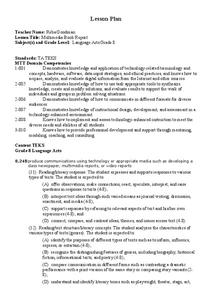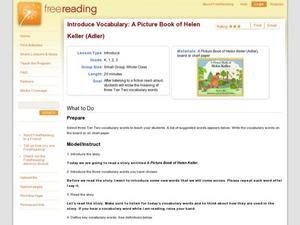Curated OER
Comic Book Characters
Explore gender stereotypes by analyzing how male and female characters are depicted in comic books. Using the provided Comic Book Analysis sheet, young scholars record the attributes of male and female comic book characters. Then the...
Library Sparks
Reference Tools Vocabulary Challenge
Learners love the opportunity of going to the library to jump into that one comfy chair in the whole room with a book, or be a lucky one to get to the computers before anyone else. But knowing how to locate books and other reference...
EngageNY
Preparing for the Mid-Unit Assessment: Planning the Children’s Book
Pupils complete a My Children's Book Plan worksheet to carefully prepare for a narrative writing project. Scholars also continue working in their groups from lesson plan two, using their scavenger hunt worksheets to discuss what makes a...
Literacy Design Collaborative
Using Textual Evidence to Analyze Literary Responses to Historical Events
Scholars analyze Animal Farm to learn how to add textual evidence into essays to support their ideas. They search for a deeper meaning to the story and how it relates to the text Totalitarianism and Revolutions in Russia. To finish,...
Curated OER
Using Informational Books: Index, Table of Contents & Alphabetical Order
Students recall and use previous knowledge of the library's reference and nonfiction sections. Also they utilize various forms of reference (encyclopedias & dictionaries) and nonfiction books.
Curated OER
Multimedia Book Report
Young readers plan and draft a book report focusing on the five key components of a novel: plot, character, setting, conflict, and theme. After completing a story board, pupils then prepare a PowerPoint book report that is shown to the...
Curated OER
Introduce Vocabulary: A Picture Book of Abe Lincoln (Adler)
The story of Abe Lincoln serves as the backdrop to this vocabulary-in-context activity as you read David Adler's A Picture Book of Abraham Lincoln. Scholars learn these politically themed words before listening to you read the story...
Curated OER
Introduce Vocabulary: A Picture Book of Helen Keller (Adler)
The story of Helen Keller is a fascinating one for young scholars; use it to practice reading comprehension and new vocabulary as learners listen to you read David Adler's picture book (hint: this strategy can be applied to any book)....
Curated OER
Introduce Vocabulary: Alphabears: An ABC Book (Hague)
Learn new words in the context of Kathleen Hague's whimsical alphabet book, Alphabears: An ABC Book (note: you can use these strategies for any text). Get pupils ready by introducing the new words they will hear: useless, gruff,...
Curated OER
Introduce Vocabulary: Alexander, Who Use to be Rich Last Sunday (Viorst)
Although this vocabulary-in-context activity is focused on Judith Viorst's book Alexander, Who Use to Be Rich Last Sunday, the strategy can be applied to any book budding learners read with you. First, introduce the three new words you...
Curated OER
The Book Thief: Discussion Questions
Expand your study of The Book Thief by Markus Zusak with a question for each level of Bloom's Taxonomy. These questions focus on part four of the novel; each is paired with at least one quote from the text for context and teacher reference.
Museum of Tolerance
Family Role Model Activity
What does is take to be a role model? Through grand conversation, and the use of books and a graphic organizer, scholars find out and apply the requirements to identify a role model within their family. They then journey through the...
Curated OER
Children's Picture Books
Fifth graders will enhance their typing skills and practice using Pages, a software for Mac computers, by writing their own children's book. Note: This lesson plan refers to a template that is not included, however, you can adapt this...
Curated OER
Read 'n' Give-Planning Our Book Drive
Students participate in a book drive. In this communities lesson, students brainstorm ways of collecting books for donation and design a book drive for children in the community.
Roald Dahl
Matilda - The Reader of Books
The titular Matilda from Roald Dahl's famous novel adored books above all things. Discuss why it is important to read stories from across cultures and around the world using the first chapter from the ever-loved story Matilda.
EngageNY
Writing the Children’s Book: Day One
With a brief mini-lesson, scholars learn about using strong verbs, sensory details, and precise descriptions. Next, pupils continue working on their children's book storyboards before choosing their strongest pages for peer critiques.
Curated OER
Use Digital Photos of Scary Things to Inspire Poetry Writing
There's nothing like a provocative image to inspire a creative writing session. In the language arts lesson presented here, middle schoolers bring in digital photos of scary objects, such as a big spider, or a hornet's nest. The pictures...
Curated OER
Publishing a Book Review
Pairs use desktop publishing software, as well as digital video and camera equipment, to craft a book review. These reviews are then shared with others in the school community through the class or school website.
Novelinks
The Book Thief: Anticipation Guide
Introduce the major themes in Markus Zusak's award-winning novel, The Book Thief, with an anticipation guide that asks readers to agree or disagree with a series of statements.
Curated OER
Use Or Abuse?
Young scholars explain the meaning of "use value" of nature's resources by researching and writing studenT books personifying an aspect of nature. They produce public service announcements regarding use value for their local community.
Curated OER
Reference Materials
Pupils discuss reasons to use reference materials, identify correct reference material to use for specific information, find answers to specific questions by locating information in encyclopedia, dictionary, atlas, almanac, glossary,...
Curated OER
Encyclopedia Introduction
Second graders demonstrate how to use reference materials. In this library media lesson, 2nd graders are introduced to the encyclopedia and are shown how to use the encyclopedia as a reference. Students use encyclopedias to complete a...
Curated OER
Word Reference Materials
A class discussion on reference materials opens up a lesson plan on how to use these important resources. They discover that dictionaries, glossaries, and thesauruses are called word reference resources, and they practice using them. The...
Curated OER
Using the Comprehension Strategies
High school learners review the six major reading comprehension strategies. They demonstrate the strategies by putting them into action using more complex reading. They finish by discussing a seventh strategy, monitoring comprehension.

























